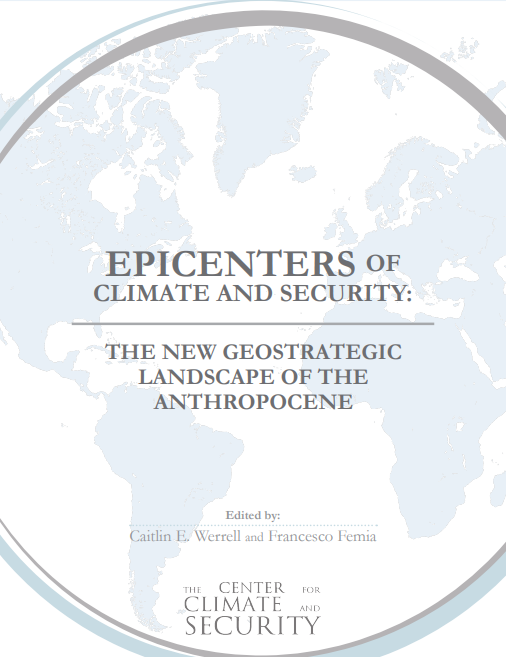The report Epicenters of Climate and Security: The New Geostrategic Landscape of the Anthropocene, published by the Center for Climate and Security, identifies 12 key climate risks with significant potential to impact international security and shape this century’s geostrategic landscape. It stresses the situation’s urgency and underscores the need for global governments and institutions to prioritize these climate and security epicenters. It also offers valuable insights into managing systemic climate security risks, providing practitioners and policymakers with the necessary tools.
Epicenters of Risk
It identifies regions where climate-driven risks intersect with geopolitical and socioeconomic vulnerabilities. These include:
- The Arctic
- The Sahel Region (Central Africa)
- Central America and the Caribbean
- South Asia
Key Security Risks
It highlights several key security risks associated with climate change, including:
- Climate change acts as a “threat multiplier” that exacerbates instability in critical areas and triggers natural disasters.
- Potential impacts on agriculture, energy, water, and migration, leading to economic challenges and transnational security issues.
- Risks of state failure and increased refugee crises in nations that are already fragile due to climate impacts.
- Tensions between major powers over disputed zones affected by climate change, such as the South China Sea and the Arctic Ocean, can affect world order.
Overview
I. CLIMATE AND SECURITY EPICENTERS
Provides a comprehensive overview of how climate change impacts various sectors and regions, thus highlighting the interconnected nature of climate and security issues. Consequently, it underscores the importance of addressing these challenges through a holistic and integrated approach to ensure global stability and resilience in the face of climate-related threats.
Eroding Sovereignty
- Climate change affects sovereignty and global governance, demanding innovative strategies and international cooperation for security. Traditional sovereignty concepts require reassessment in light of climate risks.
Water Towers
- The mountains are crucial for water supply. Climate change could cause security risks and water conflicts in these regions. Sustainable management, cross-border cooperation, and adaptive strategies are recommended to mitigate threats.
Disappearing Islands
- Rising sea levels threaten island nations, causing potential territorial loss, conflicts, and displacement. International cooperation and adaptive strategies are urgently needed.
Dire Straits
- Maritime chokepoints like the Strait of Malacca, Hormuz, and the Suez Canal are crucial for trade and geostrategy. Climate change, geo-political competition, piracy, territorial disputes, and trade disruptions pose threats, requiring coordinated efforts for their safe operation.
Nuclear & Climate
- Discusses the relationship between nuclear energy, climate change, and global security, emphasizing the necessity for risk assessment, governance, and international cooperation.
Health Security
- Highlights the interconnected challenges of climate change, global health, and security. It promotes integrating these concerns into military policy and global health measures, emphasizing proactive governance, risk management, and international cooperation.
Coastal Megacities vs. the Sea
- Discuss climate change’s impacts on coastal megacities and the security implications of rising sea levels and extreme weather events in urban areas.
Weaponization of Water
- Explores how water resources can be weaponized in a changing climate, highlighting the security risks of water scarcity and competition.
Melting Arctic
- Examines the changing dynamics in the Arctic region due to climate change, including geopolitical implications, resource competition, and security challenges.
Fish, Food Security, and Future Conflict Epicenters
- Focuses on the intersection of climate change, fish stocks, food security, and potential conflicts arising from resource scarcity.
Climate, Coffee, and Security
- Explores the security implications of climate change on coffee production and the potential socio-economic impacts in coffee-producing regions.
Migration and Displacement
- Discusses the security challenges posed by climate-induced migration and displacement, including potential conflicts over resources and livelihoods.
II. MANAGING SYSTEMIC RISKS
Highlights the importance of proactive risk management, early warning systems, and technological innovations in tackling the systemic risks that climate change poses to security. By using advanced tools and strategies, stakeholders can more effectively comprehend, anticipate, and react to the intricate challenges resulting from changes in the climate. This ultimately improves resilience and preparedness against climate-related security threats.
Tools for Understanding Systemic Risks like Climate Change
- Explores the interconnected nature of modern society and economies, highlighting the risks posed by interdependencies and linkages that can lead to cascading failures in the face of climate-related disruptions.
Foresight Tools & Early Warning Systems
- Discusses the importance of vulnerability assessments for abrupt and non-linear climate risks, emphasizing the need for early warning systems to mitigate the impacts of climate-related events.
Mapping Epicenters of Climate and Security Vulnerabilities
- Examines the process of mapping vulnerabilities related to climate change and security, identifying key areas of concern and potential hotspots for future risks.
Capturing Climate and Security Risks Through Satellites and Earth-Observing Technologies
- Explores the role of satellite and earth-observing technologies in monitoring and assessing climate and security risks, providing valuable data for decision-making and risk management.
Opportunities for Addressing the Climate-Nuclear-Security Nexus
The document suggests potential opportunities for addressing the climate-nuclear-security nexus, including:
- Exploring the dynamics of nuclear security in the Anthropocene and considering the risks and complexities of using nuclear power as a low-carbon energy source.
- Recognizing the potential growth in nuclear capabilities in novel ways and regions may give rise to complex geopolitical challenges.
- Addressing weak governance and the risk of theft of nuclear materials by non-state armed groups as potential challenges in the context of climate change and nuclear security.
These insights underscore the interconnected nature of climate change and security, emphasizing the need for comprehensive strategies to address the multifaceted risks posed by climate change on a global scale.




